READY TO GET STARTED?
REQUEST A FREE ESTIMATE
Fill out the form below or call (888) 466-7849 for a free, no-obligation estimate.
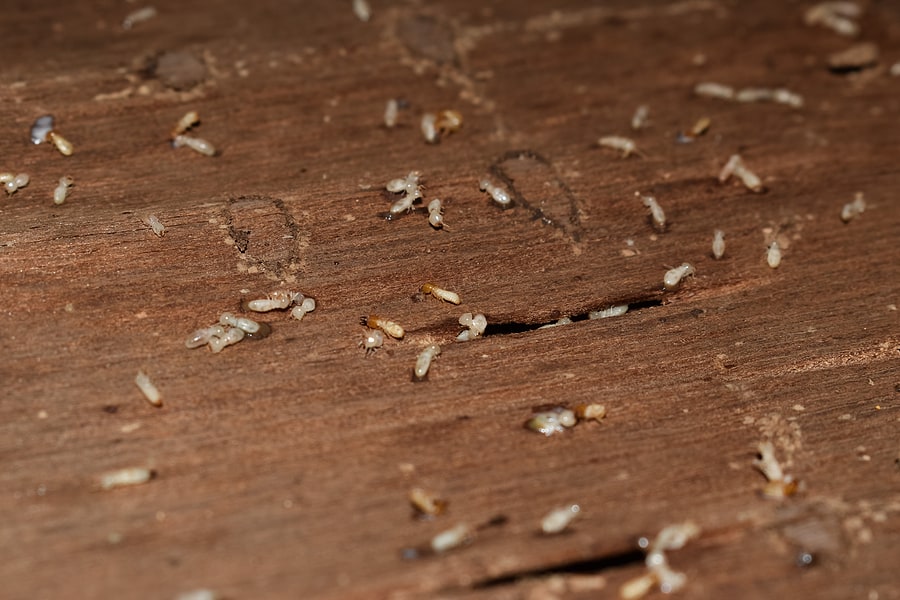
Termites are highly destructive household pests, causing billions of dollars in damages to homeowners annually. Most homeowner’s policies don’t cover termite damage. What options do homeowners have to protect themselves from these pests?
Two options that are available are a termite warranty and a termite bond. These terms are often used interchangeably but they are, in fact, different.
A termite warranty is similar to an insurance policy you take out against termites. It is insured by an insurance company and allows for more coverage against damages. These warranties will also include an agreement for ongoing monitoring and/or maintenance for the length of the warranty term. They also require the termite control company who provides it to treat for termites if they are found on their annual termite inspection during the warranty period. It can also specify if the pest control company will repair any damages from termites or if they will only retreat the home. Some warranties can even be transferred between homeowners (such as during the sale of the home) but others cannot be transferred.
Termite bonds are similar to warranties. The difference between the two is that bonds require the pest control company to hold a specified amount of money in a surety bond.
Some kind of protection against termites and termite damage is beneficial to homeowners. If you are interested in scheduling a termite inspection or taking out coverage against termites, contact your pest control company for more information.
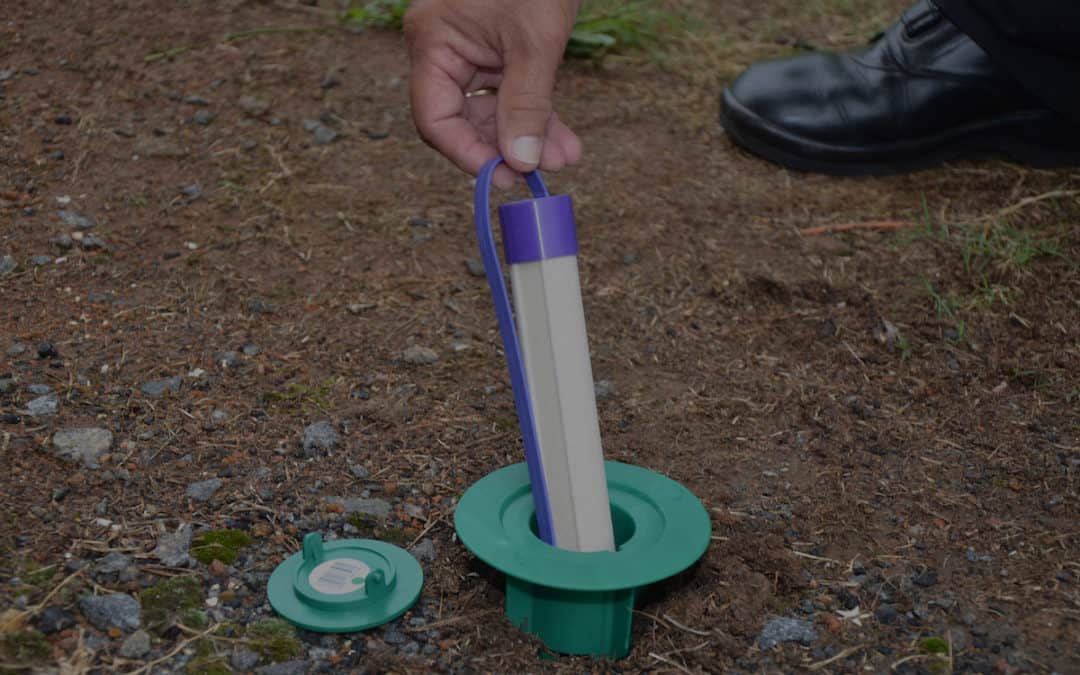
When you purchase your new home, you have hundreds of things to consider and decide on: What furniture do you need? Are any renovations needed right away? Does your home insurance cover everything? There is a lot to take in!
One thing that typically doesn’t come to mind until a few months after you’ve moved in is, “What about termite protection?” Termites are something that can cause damage to your home, and that damage is often not covered by home insurance policies. Sometimes, you won’t think about it until the damage has already occurred, but there are steps you can take to prevent termite damage. With the Sentricon Termite Colony Elimination System and a termite provider’s inspection, your home can be protected.
So, what are the benefits of Sentricon Termite Protection?
Termite protection may not be at the top of your list, but when you think about the $5 Billion in damages that termites cause every year, it is something to highly consider! If you’re considering purchasing a new construction home, connect with your builder about what they offer your home for termite protection!
If you have questions about the right type of termite protection or warranty for your home, give your local termite provider a call; they’ll be able to answer all your important questions so you can make the right decision for your home and family.
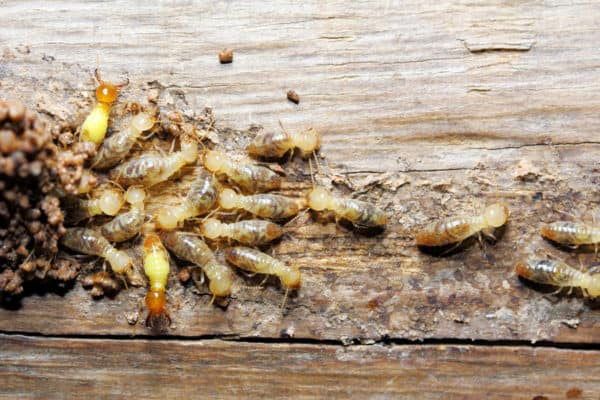
Termites can wreak havoc on a home without the homeowner even realizing it. By the time their presence is realized, the damage is extensive and costly. Termite colonies don’t just consist of hundreds of termites – they number in the millions! Termites can invade any type of home whether it is brick, stucco, wood, or other material. Termites will eat any material that contains cellulose, not just wood. These materials include cellulose insulation, framing timbers, and even drywall. An annual termite inspection can help prevent these devastating infestations by catching and eradicating them early, preventing significant damage and saving money in treatment and repair costs.
Termite inspections will typically begin with the inspector examining all possible points of entry to the home looking for common signs of termites. These signs include mud shelter tubes (pencil sized tubes termites use to travel), piles of frass (termite excrement), termite mazes on walls, discarded wings, etc. The inspector will also use a tool to gently tap on the interior and exterior walls of the home listening for hollow-sounding wood which in another sign of termite damage. The inspector will then check the exterior of the home, including crawlspaces, to check for wood to soil contact which is the easiest way for termites to gain access to a home. Wood to soil contact could be a stack of firewood that is too close to the home or deck posts not set in concrete. The inspector will also check trees, stumps, wooden retaining walls, fences, sheds, detached garages, and any other structures on the property. They will then notify you of their findings and recommend termite treatment options.
The best way to protect your home from termites is with a termite bond. This is a termite warranty between the termite company and the homeowner that is similar to a maintenance contract. They are usually made up of two components: an agreement for termite inspections during the lifetime of the bond and an agreement to provide termite control and treatment if termites are discovered. Bonds are especially important in real estate transactions. Most lenders will at a minimum require a termite inspection. Securing a termite bond provides you with a level of termite protection that can help you qualify for loans and also improve the marketability of your home.
If you suspect you have termites in your home or just want to be proactive in making sure these pests don’t invade your property, contact a professional termite control company and set up your annual termite inspection to give you peace of mind.
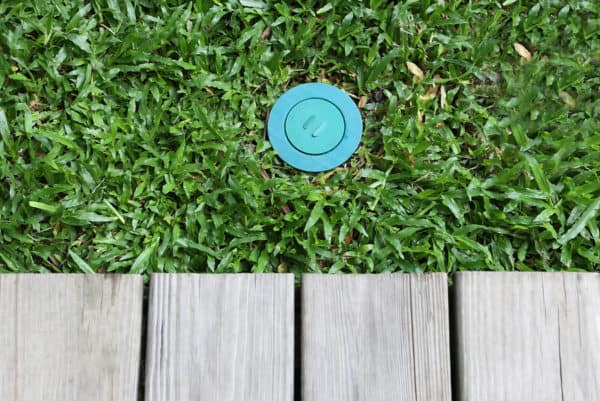
Termites can be a homeowner’s worst nightmare. Termites do their damage from the inside out and they often aren’t detected until after significant destruction has already been done. The signs of termites are often difficult to find until colonies are well established. In fact, termites cause an estimated $5 billion in damages each year in the United States. Yet many people still question if termite protection is worth the cost.
Structural damage caused by termites is the most expensive with an average cost of $3,000 for repairs. This amount varies depending on the extent and location of the damage that is caused. In addition to the structural damage caused by termites, cosmetic damage can also require repairs, costing an estimated $2,000 to fix things like discolored sheetrock, buckled floors, and peeling paint. This amount also varies depending on the materials that were damaged and the materials used to repair or replace it.
Termites must be exterminated before any repairs are done. The cost of a termite treatment not only include the termiticides or baits used in the treatment, but also the labor, training, and service hours for the termite exterminator. The average cost of termite control is $4 to $7 per linear square foot of your home. This estimate also varies based on the type of termite warranty provided, the location of your home, and the type of treatment required.
Unfortunately, most homeowner’s insurance policies do not cover termite damage and sellers are usually responsible for covering termite damage during the sale of a home. This can vary so it is always a good idea to check your state regulations. This also usually includes a termite inspection prior to the sale of the home.
Knowing the potential costs of termite damage and repair is reason enough to invest in termite protection. What options do homeowners have when a homeowner’s policy doesn’t cover termite damage? A termite bond or termite warranty is your best bet. A termite bond is a warranty between a homeowner and a termite company that functions as a maintenance contract for termite prevention, damage, and repair. Termite warranties vary by company, but they generally include an agreement for annual (or more often) termite inspections during the lifetime of the warranty, an agreement to provide treatment if termites are discovered (often at no additional charge to the homeowner), and in some cases an agreement to repair damages. Not all homes, however, qualify for these repair bonds so always check with your termite control provider about this.
A termite warranty provides you with peace of mind against termite damage. The warranty guarantees that the pest control company will continuously inspect your home and make sure that new infestations are discovered before they can proliferate. Termite warranties are also beneficial when buying or selling a home as they are often required before a sale can occur. Lenders will often not approve mortgages for at-risk homes without a termite bond. Only certified pest control companies can issue termite warranties. Yearly costs typically run $300-$400 for the warranty coverage, which includes the annual termite inspection.
Click here to schedule a free termite inspection.
What is the Difference Between Traditional and Green Pest Control?
Termite season is here! You may be seeing many ads for termite protection for your home, but you’ve gone years without termite protection. Is it even worth it?
Well, let’s look at the facts when it comes to termites and your home.
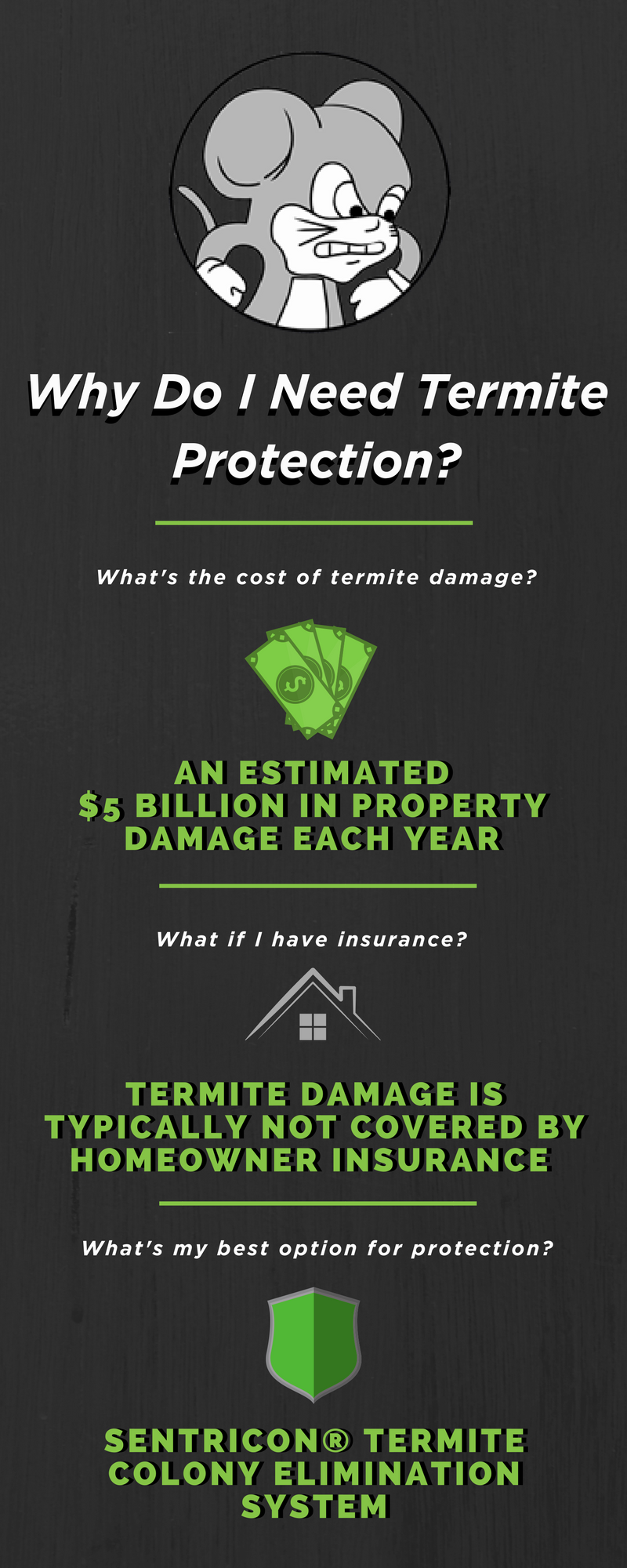
While you may not notice any signs of termite damage in your home currently, that doesn’t mean there’s not a silent, ongoing termite infestation causing damage to the structural integrity of your home. By having your home inspected, you may be able to catch the damage before it’s too late or prevent damage from ever impacting your largest investment.
When you sign up for Northwest Termite Service, here is what you can expect:
Don’t wait until you’re stuck with an insurmountable repair bill. Call (888) 466-7849 and set up a free termite inspection today!